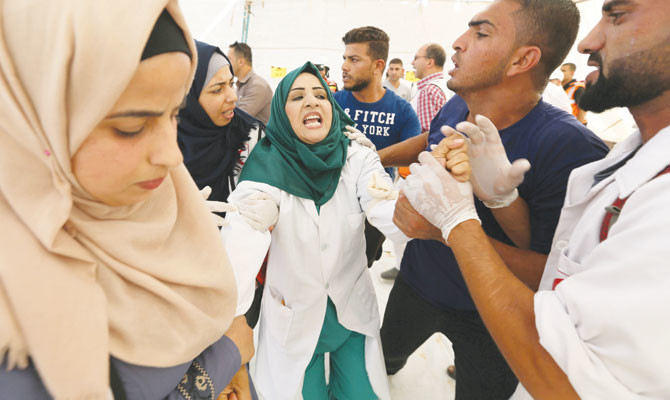GAZA CITY: Israeli troops shot dead two Palestinians during Friday protests at the Gaza-Israel border, the Health Ministry in Hamas-run Gaza said.
It said in a statement that one of those killed was a 14-year-old boy shot in the head during border confrontations east of Rafah in the southern Gaza Strip.
Earlier the ministry reported the killing of Ghazi Abu Mustafa, 43, and said he was shot by Israeli soldiers, also in the head, near the frontier fence, east of the southern town of Khan Yunis.
The Israeli military said about 7,000 Palestinian “rioters” threw rocks and rolled burning tyres at soldiers, and at the fence itself, at several locations along the border.
“Troops are responding with riot dispersal means and firing in accordance with the rules of engagement,” an English-language statement said, without elaborating.
There has been violence between the Israeli army and Palestinian protesters in the Gaza Strip since late March in which at least 156 Palestinians have been killed.
Hamas has pledged revenge after Israeli air and artillery strikes on the coastal enclave killed a number of its members in recent weeks.
Israel and Hamas have fought three wars since 2008.
A week ago a Palestinian gunman shot and killed an Israeli soldier at the border, sparking a fierce wave of Israeli bombing that ratcheted up fears of another war.
A degree of calm was restored until Wednesday when Israel said its troops came under fire again, with one soldier wounded.
It hit back with artillery fire which killed three Palestinians at a Hamas military base, near the border, east of Gaza City.
On Friday, Defense Minister Avigdor Lieberman announced plans to build hundreds of new homes in a settlement in the occupied West Bank where a Palestinian stabbed three Israelis, one fatally.
“The best answer to terrorism is the expansion of settlements,” Lieberman wrote on Twitter, announcing 400 new housing units in the Adam settlement north of Jerusalem a day after the deadly stabbing.
The teenage attacker sneaked into the settlement on Thursday evening by climbing a fence, Israeli media reported.
He stabbed three people seemingly at random before being shot dead, the army said, naming the dead Israeli as Yotam Ovadia, 31. Israeli media said he had two young children.
A 58-year-old victim was said to be seriously wounded but stable. The third victim was lightly injured.
The attacker was later identified by official Palestinian media as Mohammed Dar Youssef, 17, from the village of Kobar.
The army said Friday it had raided the village, questioned a number of his family members and suspended their work permits.
During the raid on Friday morning, clashes broke out between young Palestinians and soldiers firing tear gas.
“The rioters hurled large rocks and firebombs and rolled burning tires at (Israeli) troops, who responded with riot dispersal means,” an army statement said.
The army also established a checkpoint at the edge of the village.
Official Palestinian news agency Wafa said three people were arrested. The army added it was “reinforcing the defense” of Adam and other settlements.
All Israeli settlement construction in the occupied West Bank is considered illegal by the international community.
Israel rejects the widely held view that settlement expansion is one of the greatest obstacles to peace with the Palestinians.
US President Donald Trump’s special envoy Jason Greenblatt called on Palestinian President Mahmoud Abbas, whose Fatah movement leads the government in the West Bank, to condemn the attack.
“Yet another barbaric attack tonight. When will President Abbas and Palestinian leaders condemn the violence?” he wrote on Twitter.
There was no response from Abbas’ government, which has cut ties with the Trump administration over its stance on Israel.
“Terror must be condemned by all,” the UN envoy for the Middle East peace process, Nickolay Mladenov, wrote on his Twitter account.
“Such horrible acts serve only those who stand in the way of peace.”
The attack came after a period of relative calm in the West Bank.
The last stabbing attack in a West Bank settlement was in April, when a Palestinian tried to stab an Israeli with a screwdriver near a petrol station in an industrial area connected to the Maale Adumim settlement east of Jerusalem.




























